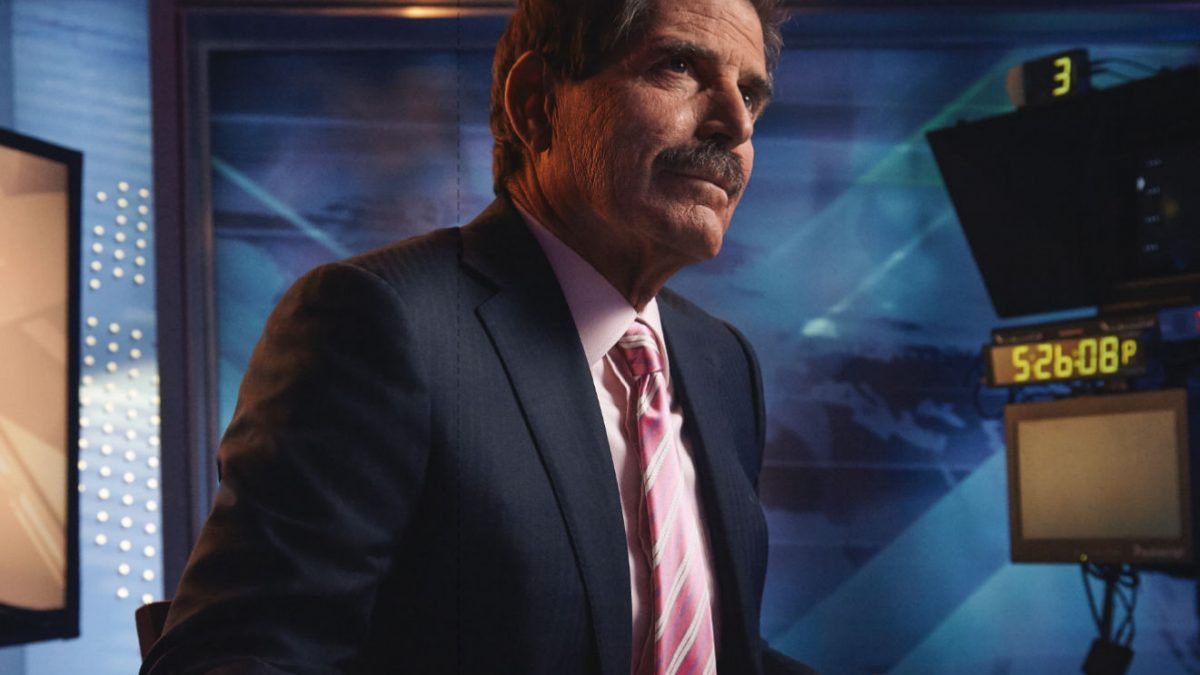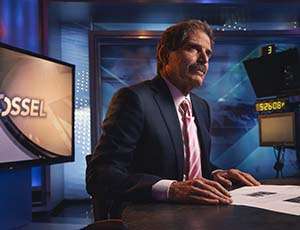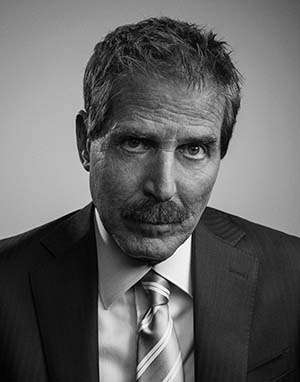John Stossel: The Man. The Myth. The Moustache.
The TV newsman looks back on his career at 20/20 and Fox News, and talks about the future of video.

When John Stossel was diagnosed with lung cancer in April, he announced it in the most characteristic way possible: He dashed off a column from his hospital bed with a quickie economic analysis of why nurses don't care when your out-of-date heart monitor beeps all night long. (The explanation involved the word sclerotic and the phrase "hospitals are largely socialist bureaucracies.")
Stossel, 69, is now cancer-free and ready to move on to the next thing. In recent years, the man with the moustache has developed an alarming habit of giving away the Emmys he won as a consumer reporter, saying he considers them ill-gotten gains; they all predate his conversion to libertarianism and the subsequent realignment of his career to preach the gospel of free markets and consumer choice.
First as a reporter at ABC's 20/20, where he made his name with his signature "Give Me a Break" segments, and then as a commentator at Fox for the last seven years, the television newsman has served as the most recognizable face of libertarianism, appearing on America's TV screens week in and week out and invading the minds of America's youths with his Stossel in the Classroom educational videos. With a penchant for antics like piloting onto the set on a Medicare-subsidized mobility scooter or printing out the entire federal register, Stossel has always prioritized making arcane economics intelligible to the boob-tubing masses.
The final episode of his eponymous show on the Fox Business Network aired in December. Starting in 2017, he'll be working with Reason TV to produce web videos and with the Charles G. Koch Institute to mentor young media professionals. He'll continue on as a commentator in a role that he describes as "libertarian senior statesman" at Fox.
Editor in Chief Katherine Mangu-Ward spoke with Stossel over the phone in December about the past, present, and future of video.
Reason: Is television getting dumber? Was there a golden age of news broadcasting, or was it always dumb?
Stossel: TV has always been relatively shallow. You can read at seven times the speed you can listen. And when there were five channels, we had to try to appeal to everybody. If you watch programming from what people call the "golden age," there was not much nuance there.
Also, our brains have changed. When I was on 20/20, we would do a 17-minute piece on gay marriage, say, or the transgender world. And when the executive producer would say, "You've got to take out two minutes," I would resist because I just didn't think you could take out those two minutes and have the story be nearly complete. All of it was so important! And yet now if I watch those stories, they are tediously long.
And do you think that's because we've gotten better at the craft of storytelling with video or do you think it's because the attention span of the viewer has changed?
The attention span of all of us has changed. We are just doing so many more things at a time. Is this worse? I don't presume to make a judgment. Before you called I was in my car listening to the Iliad, and there are parts that go on and on.
Ugh, Homer. There's so much padding. Somebody should really edit that guy.
Exactly.
If you were beginning a media career right now, would you be looking at cable news or broadcast television?
No. When I started to make video, you had to have a camera that cost $100,000, an edit bay that cost—I don't even remember what it cost! We would go out with a three-man band to cover things: a lighting guy with all the heavy lights, and the sound specialist, and the cameraman. You had to go work for a television station or a movie company. Now everybody has all this equipment in their smartphone and their laptop. So why go through those cumbersome steps?
Do you think your job is the last to go in your industry, the guy with the face in front of the camera?

I would be arrogant to say last, but one of the last certainly. I'm thinking about the writers. What about the guy who owns the media company, will he be replaced by a robot? Probably. Who will be last? I don't know.
But another point is that despite the fact that the electrician and the soundman don't have jobs in television anymore, they're not unemployed and they're almost certainly happier. They saw other things to do and presumably better things to do. Working with them on a story was miserable when I was a young reporter in New York. I would be all fired up to cover people who'd been screwed by the dairy monopoly or the con man who ripped people off. I would jump out of the car eager to work. Meanwhile, these guys who were bored with their jobs would take five minutes just to get out of the car and by the time they got their lights set up and gear ready, the life had been sucked out of the room. So most of the robotic improvements are great.
This is how people feel about the robots replacing certain functions up until they're the one on the chopping block. But you seem to be cheerful about that process.
Yeah—selfishly, perhaps, because I've had my career.
So when are you going to be replaced by a robot?
2045. In March of that year. When a prediction is wrong, nobody will remember. But if I'm right, then someone will say, "What a genius!"
So it's better to be as specific as possible.
Right. I assume it's going to take another 25 years before they develop robots who present things in a human enough way that it's appealing to most viewers, but the robots will never sleep and will be much smarter than I and better looking, so it's logical that people like me will be replaced.
"You have to assume people have no interest and no knowledge. It just became natural to me to do it by asking provocative questions like 'Could greed be good?'"
In my new career, I'm already accepting that I'm largely old and useless. I want to help attractive young people to jump in there and do what I've been doing.
The best way to learn is just by doing and watching it and learning from mistakes, cutting it down and seeing if you like doing it and if you can find an audience.
I see people like my son [Max Stossel] making video on the side. He's made three videos while working for other people. He's spending his own money and they get millions of hits. It's a way to test your creativity.
Are you happy that your son is following in your footsteps? Many people, particularly people in media and creative professions, would rather their kids become accountants or something.
I would not be happy if he were following in my steps. But I think he's exceeding me. That makes me happy. He's bringing in music and actors and being creative in ways that would not have occurred to me.
You're famous for your distinctive, semi-rhetorical style of questioning: "Could greed be good?!" "Are we scaring ourselves to death?!" Is that something you evolved consciously, or did you fall into it as a natural consequence of trying to elicit usable answers from interview subjects?
Mostly the latter. And not so much eliciting good answers, but from my own immaturity and lack of intellectual patience. Once I discovered the truth and the beauty and the power of markets, I was a born-again zealot and endlessly disappointed in the boring ways these ideas were presented.
Maybe it's because my father was never very good at teaching. I was frustrated that when he taught me how to race sailboats, he was so clumsy at using words and so reluctant to use them. I kept thinking, boy, I could've learned this a year sooner if someone had just told me "trim the sheet" means "pull in that rope."
I realized that no one wants to listen to the specifics of economic theory except a few professors at very high-level universities. You have to assume people have no interest and no knowledge. It just became natural to me to do it by asking provocative questions like "Could greed be good?" It makes people sit up and take notice. One of my cameramen said you have to hit the donkey on the head to get his attention. I try to find different ways of doing that.
In the era before detailed analytics data, how did you know when a story was working?
I just looked for what interested me.
So you were your own focus group?
Yeah. I narcissistically assumed if it interests me, then it would interest others. Even though with the networks there was lots of money at stake and we did have ratings, it was a very blunt form of feedback. It would come in a week later. In some cases, we only had rating periods three times a year and it would come in much, much later. And even then it would be a rating of the hour or the quarter hour. It never really could tell you if the audience was responding to you or your story or if they had just died and the TV is still on that channel.
What stories did you have to fight to get on the air?
Well, a show I did on Charles Murray's The Bell Curve [which controversially asserts that different races have different average IQs] ended up never running. And Murray at the end of it said, "You know, it's just as well because this information makes no one happy."
One of my biggest fights was my first special, which was the turning point in my career as a consumer reporter. There were a million scare stories—cancer in grass lawn pesticides, exploding coffee pots—and I realized that we were scaring people about everything and leaving out more mundane risks like driving in the rain or alcohol abuse. And that this was not a public service and, in fact, just the quantity of regulation was slowing the economy, and what really kills people is poverty, and by having a million rules that prevented the supermarket or the factory from opening we were killing people that way too. Probably more people.
"What really kills people is poverty, and by having a million rules that prevented the supermarket or factory from opening, we were killing people that way too."
Producers quit rather than participate in that show. But ABC, to its credit, agreed to put it on, adding a Nightline-like segment afterward. I wanted to title it We Are Scaring You to Death, and they eventually agreed to the question—Are We Scaring You to Death? Well, actually, Are We Scaring Ourselves to Death?
Stephen Breyer, who in the following months became a Supreme Court justice, was in the audience. I thought it would probably be the other way, but to my surprise he seemed to support me, though he was so convoluted and nearly unintelligible that we couldn't air it in the final cut.
So producers quit rather than do that show, and ABC was surprised that it got good ratings. That was my first special and that got Special of the Year. For the next 15 years that allowed me to do some more libertarian shows. A lot of resistance.
Another one was something all economists agree on: Rent control is self-destructive. Walter Williams says—it's a great line—that the best way to make a city look like it's been bombed is not to bomb it but just to pass rent control. The lawyer who reviewed the story could not accept it because he lives in a rent-controlled apartment in New York City, so in his case it was personal.
I finally got these stories on, but it took many months. One took a year and a half. It was a Reason story adapted for television called "The Nanny State," and the executive producer said, "These things don't bother me!" When they finally ran, they got good ratings. But the New York media leftists, their brains just don't receive these ideas well.
You're one of the most prominent advocates of libertarianism and free markets. You frequently get accused of being in the pocket of big business. Are you? If not, why is that accusation so common?
We celebrate the achievements of some rich people and then we become associated with protecting the rich. That gets criticized. People don't understand the difference between crony capitalists and genuine free markets. People think that if somebody makes money, that means the customer lost money. Something I read in Reason years ago that opened my mind is this idea of the "double thank you" moment. You give a clerk a buck and she gives you a cup of coffee and if you both say "thank you" it's because you both think you won something. That's not intuitive.
Will this problem get better or worse during the Trump administration?
I assume there will be more of that as this Cabinet is filled with billionaires. If I like [Labor pick] Andy Puzder and [Education pick] Betsy DeVos, I'm defending billionaires, and I'm an old white man, an old affluent white man, so it must make us fat cats, protecting our turf.
What are stories that you've felt compelled to revisit over the years, either because you got something wrong or because there was something more to say? Are there topics you feel like you haven't gotten right yet?
I was foolishly convinced that we were already in an era of rampant inflation, so much so that I bought gold and silver. It's been my worst investment. I keep thinking it will happen, but it certainly hasn't.

I've tried various ways of telling the entitlements crisis story. I was captivated by this many years ago at 20/20. How do you get people to care about the abstract stuff? I interviewed my father. I tried graphs. I went down to old-age homes in Florida and took them from saying "Don't touch my Medicare" and walked them through how they're collecting much more than they've put in and how it's unsustainable and how their grandchildren are getting screwed. By the end, maybe half were convinced. I thought that was a convincing story.
Since then I've learned that there are those who understand reason and the majority who will never get it. And nothing I can do will make much difference for most people.
Trade is very difficult for me to get right, to explain how wealth is created so that Donald Trump could understand it. Zero-sum results are just so much easier to understand.
Why do you think it's so hard to tell the story of why trade is good and important?
I think of the time when David Kelley [of the Atlas Society] said to me: "Who did more for the world, Mother Teresa or Michael Milken?" And for younger readers: Michael Milken went to jail for some form of securities fraud which he may have committed and Mother Teresa gave her life to help poor people—but the truth is that when Milken created junk bonds he created millions of opportunities for people. Millions of companies exist because junk bonds exist. He did much more for the world, all for self-interest!
There's the moment when I was interviewing Ted Turner. He'd just given $100 million to the U.N., and I said, "Well, you're a good businessman, you created CNN and many companies that have produced good things. Probably if you spent your money doing more of that, you'll do more good for the world than giving it to the bloated U.N., which will squander it." He walked out of the interview. But things like that make the point.
"Trade is very difficult for me to get right.…Zero-sum results are just so much easier to understand."
Likewise, the greed of the businessman, showing how food gets to market, following the hard work done by the rancher who raises the cattle, and how many people are involved in working hard to drive the truck at 5 o'clock in the morning to go pick it up, the investment in refrigeration equipment to get it to the supermarket, the packaging and the plastic and just thousands of people all working who don't give a damn about you, who care mostly for their own self-interest, but that's why you have a steak on your table. Not because of any goodwill or any micromanagement by government.
By being able to stand 12 minutes and show that stuff, I think we could communicate that.
Trade is much harder because it's so subtle, the millions of little gains. You can walk into a factory that's being closed because the foreign competition is cheaper, and you can interview those people who have just lost their careers, and they're crying and you are instantly moved. But it's important to tell the harder story. The Donald Trump tariff screws poor people. It hurts the innocents. We need to stop ignorant politicians from doing things like that to people.
This interview has been edited for style, clarity, and length.
This article originally appeared in print under the headline "The Man. The Myth. The Moustache.."


Show Comments (528)